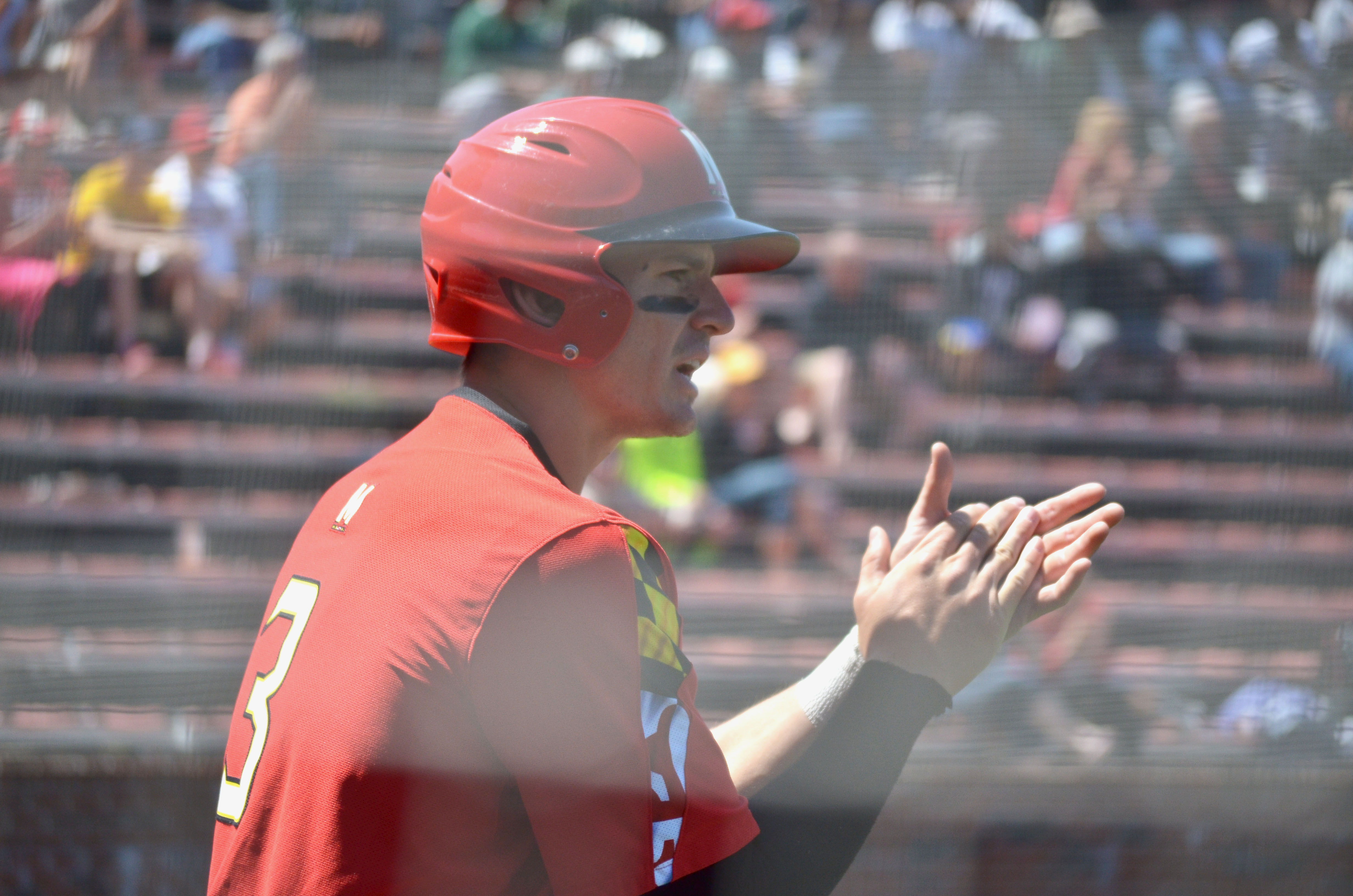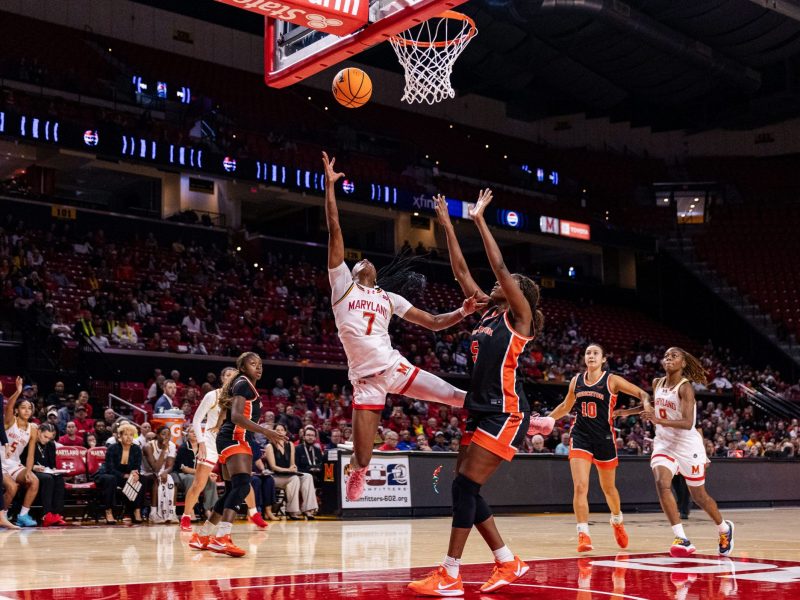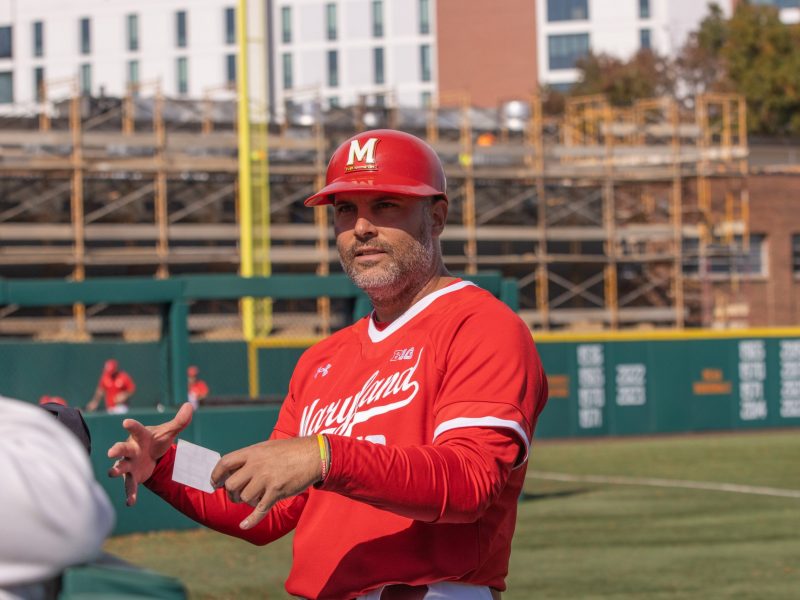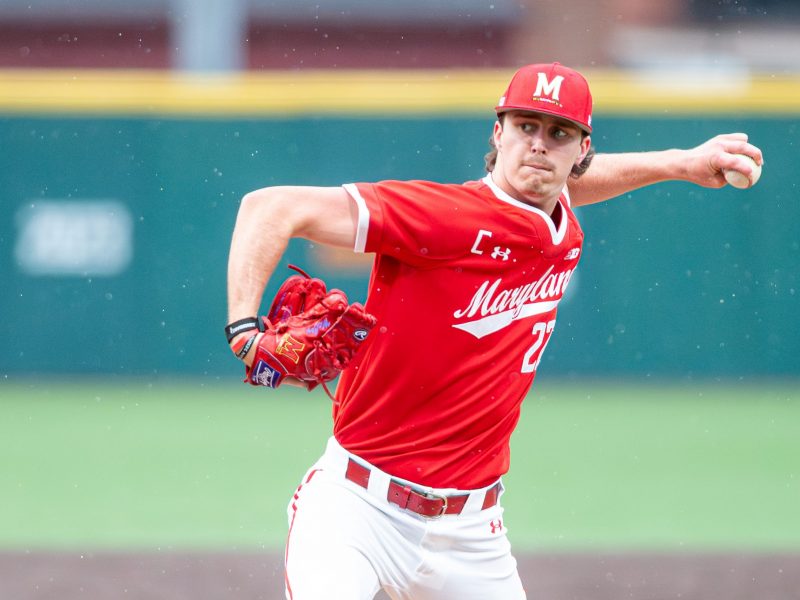Anthony Papio stood at the front door of the Varsity Team House on a chilly October evening in 2011 when Maryland baseball coach Erik Bakich told the outfielder he needed to make one promise if he wanted a spot on the roster.
Papio had just finished his fourth walk-on tryout. He was one of two players to be invited back for that tryout. So as Papio faced Bakich, he knew it could’ve marked his final day practicing at Bob “Turtle” Smith Stadium, or it could be just the beginning of his career with the Terps.
“He asked me, ‘Pap, do you think you deserve to be here?'” Papio remembers Bakich saying. “And I was like, ‘Yeah, I do.’
“He was like, ‘Yeah what?’ I was like, ‘F yeah.'”
All Papio needed to do was promise Bakich he would be the hardest-working player on the team. Papio wasn’t worried. He thought he deserved a spot on the team in the first place, and he never let that leave his mind throughout his Terps career.
Now a redshirt senior, Papio has become a staple in the Terps’ program. He helped lead the Terps to two straight Super Regionals, including the program’s first appearance, after Maryland hadn’t been to the NCAA Tournament since 1971.
“With him, you know what you’re going to get,” right-hander Mike Shawaryn said. “You know you’re going to get 100 percent every time. If anyone questions that, they obviously don’t know who he is. This guy has been through everything, and he’s still working his butt off.”
MISSING THE GAME
Papio jumped up and down in the front row of Maryland Stadium for the Maryland football team’s season opener against Miami on Sept. 5, 2011.
It was College GameDay on ESPN, and Papio could feel the energy, excitement and adrenaline of competition.
He missed it.
“Obviously, these guys get to play on a big stage all the time,” Papio said. “That’s kind of just something I want to be a part of — part of that atmosphere of being an ACC school at the time.”
Papio had opportunities to play baseball at smaller schools, such as Towson, but the Olney native wanted to compete at the highest level. He thought Maryland was his best shot to do so while pursuing an engineering degree.
“He was all about DI no matter what,” said Papio’s mom, Lynda. “He just likes the big school atmosphere. He’s more of a go-getter type. He wants to be where things are happening and be involved.”
After his senior season at Sherwood High School, Papio played for Damascus Post 171 of the Maryland State American Legion in the summer with one of his teammates from high school, left-hander Adam Abramson, who also tried to walk on to Maryland’s team.
When he arrived in College Park, Papio worked out with the club baseball team while going to Eppley Recreation Center five days per week to bulk up. One of his roommates in his triple in Ellicott Hall, Joey Saah, would drive with Papio to the batting cages at DeMatha Catholic High School to get extra batting practice in.
Papio stayed up between 1 and 2 a.m. almost every night to complete his 17-credit hours of work. He got up at 5:30 a.m. to lift. And when Papio and Abramson, Papio’s other roommate, had free time, they long tossed on LaPlata Beach.
Through all this, Papio was dealing with shoulder impingement syndrome. Without access to the baseball team’s medical facilities aside from the days he tried out, he got ice from the North Campus Dining Hall every night to ease the pain.
“When you’re used to coming from an organized practice … to having to do it all on your own, it’s hard,” Abramson said. “A lot of people gave it up. It really speaks that much more of what he was able to do and the fact that he made it.”
EARNING A SPOT
Bakich still didn’t know whether Papio was good enough to make the squad.
He saw Papio in high school when he went to watch Papio’s high school teammate, right-hander Will Bouey, who accepted a scholarship to play for Maryland his junior year. Papio even caught Bakich’s attention after hitting an RBI triple in the Maryland 4A State Semifinal at Bob “Turtle” Smith Stadium in 2011.
But at tryouts during the fall, Bakich was happy with his team. He didn’t know if there was room for Papio.
“Any time you add a player to the roster after the school year already started, it’s extremely important that person’s mental skills and intangible skills are stronger than their physical skills,” Bakich said. “You need to have a significant need where a walk-on who shows up is better than guys on your current roster or you need the depth at a certain position.”

Center fielder Anthony Papio hits a pitch during the Terps’ 4-3 loss to High Point on Sunday, April 3, 2016, at Bob “Turtle” Smith Stadium. (Marquise McKine/The Diamondback)
Before the tryouts, it appeared Bakich would add another outfielder after Jordan Hagel suffered an injury. And while Bakich ran the players through fundamental drills at the first tryout, Papio separated himself from his competitors with his quickness, his strong arm and his power from the left side of the plate.
Bakich was impressed, so he invited Papio and Abramson back the following Wednesday for an inter-squad scrimmage.
“I remember the guys asking me, ‘Can he run? Is he a good athlete?'” Abramson said. “Everyone was like, ‘Holy s—, he can move around a little bit.’ He’s not someone who’s just going to be like, ‘I have God-given talent. I can do this.'”
Bakich thought Papio would struggle against Division I competition, but Papio thrived, shooting a single up the middle against one of the Terps’ better pitchers.
When Bakich invited Papio back again the following Wednesday for batting practice in a scrimmage setting, Papio continued to show improvement.
After the fourth tryout one week later, Bakich offered Papio a spot on the team.
“He just willed himself to be on the roster and make that team,” Bakich said. “He brought it every day from an energy and an enthusiasm standpoint. He was just not going to be denied.”
GAINING RESPECT
In one of the final games of the regular season in Papio’s redshirt year, Bakich turned to the dugout and said, “Who’s the fastest guy in the dugout right now because we need a pinch runner?'”
Without hesitation, Papio raised his hand.
“Put me in.”
“He would’ve burned his redshirt year if I had put him in in that moment,” said Bakich. “He was ready to go. That’s the type of kid he is. He’s always ready to seize an opportunity. It’s no surprise he’s turned into a heck of a college baseball player.”
Papio earned respect among his teammates through his work ethic. Upon joining the team, Papio did whatever he could to be involved. He threw with teammates in the outfield when they needed to warm up, took extra batting practice withthe squad and kept the energy up in the dugout.
Papio also learned from experienced outfielders Charlie White, Michael Montville and Hagel to adjust to the speed of college baseball.
Assistant coach Dan Burton, meanwhile, ran through defensive drills with Papio almost every day to improve his jumps in the field and strengthen his throws.
“You’re kind of just thrown into things,” Papio said. “You have to be able to adapt pretty quickly to survive.”
Papio has shown his ambition through the Iron Terp Challenge, a five-day event the week after Thanksgiving meant to test players’ mental strength and competitiveness. Each player is challenged through long-distance runs, sprints, pull-ups, push-ups, swimming events, obstacle courses, and weight-lifting sessions. Some players refer to it as “hell week.”
After coming in third his redshirt freshman campaign, Papio has won the competition the past three seasons.

Teammates tap Anthony Papio’s helmet in celebration after a successful inning during Terps’ 8-1 win over VCU at Bob “Turtle” Smith Stadium on March 29th, 2016. (Rania Hentati/The Diamondback)
“He’s one of the strongest guys I’ve ever met,” said former left-hander Alex Robinson, who plays in the Minnesota Twins organization after being drafted last offseason. “I don’t know if you can tell that by just looking at him, but he can do a lot more than you can expect out of him. It just goes back to the relentlessness that he has to prove that he belongs.”
This fall, outfielder Zach Jancarski repeatedly told Papio he’d take the Iron Terps Challenge crown. And at one point, Jancarski held the lead before the “Terp Swim.”
But Papio, who had a stronger urge to win after Jancarski’s comments, beat his outfield counterpart en route to claiming his third straight championship.
“The guy is relentless,” Jancarski said. “I thought I had it, but as bad as I want to win, I know for some reason he’ll die before he lets me win.”
REBUILDING A PROGRAM
As Papio ran toward the mound from right field, he feared he would miss the celebration.
Two seasons after the Terps finished 10-20 in the ACC in 2012, Papio’s first with the team, his teammates dogpiled on right-hander Bobby Ruse to celebrate a win over South Carolina that sent the program to its first-ever Super Regional.
Papio joined in the madness just in time, as he jumped on top of the pile on the Gamecocks’ home field.
In 2008, Papio played in front of about 800 people for the Maryland High School State Championship. Six years later, he beat one of the country’s top teams in a stadium that held more than 8,000 fans.
Papio made sure to let everything set in about the victory, from the team dance party on the bus after the game to one of the lone times he’s seen a full grin on coach John Szefc’s face. He didn’t even know if he’d ever play a college baseball game out of high school. Now, he was a consistent starter on one of the best college baseball teams in the country.
“Knowing where we came when we got here to make it to that point, that was cool for me,” Papio said. “I thought we definitely had the talent to do that. I didn’t know it was going to happen in my third year here.”
The Terps were back in the NCAA Tournament Regional Final the following year against UCLA, the No. 1 overall seed. Maryland had split the first two games with the Bruins, setting up a rubber match for a spot in the Super Regionals.
In the fourth inning of that contest, Papio hit an RBI double to give his team a 1-0 lead. Szefc said that was one of his favorite memories of Papio’s career. The Terps went on to win the game, 2-1, as Maryland was one of 16 teams remaining for the second straight season.
“You expect him to make big plays,” Szefc said. “He’s made them before. He knows how important they are to make them. It doesn’t surprise me with him. If nothing else, you always know you’re going to get 150 [percent] with him.”
TAKING CHARGE
“Ten f—— seconds! Let’s go!” Papio screamed at his teammates as they ran suicides at the end of practice at Bob “Turtle” Smith Stadium on April 19.
After Papio’s team lost an inter-squad scrimmage, assistant head coach Rob Vaughn had Papio’s team run around the entire field multiple times, a drill the team calls “triangles.” Each time, Papio won by a landslide, and when he finished, he made sure his teammates didn’t let up.
When the Terps lost eight players between the MLB draft and graduation last offseason, Szefc needed Papio to step into a larger leadership role. He’s one of the two redshirt seniors on the squad, and he’s the lone senior in the offensive lineup.
And despite hitting just .243 this season, he’s brought energy into the dugout.

Anthony Papio grips the bat during Terps’ 8-1 win over VCU at Bob “Turtle” Smith Stadium on March 29th, 2016. (Rania Hentati/The Diamondback)
“If we ground into a double play or leave the bases loaded, he’ll try to set a positive tone even when it’s not a positive atmosphere,” Szefc said. “He does stuff coaches would do.”
Papio and left-hander Robert Galligan are the lone remaining players from the 2012 team, so players ask Papio for advice and inquire about how they can assist a team that’s struggled this season. After back-to-back Super Regional appearances, the Terps are 25-22 and in danger of missing the NCAA Tournament.
Still, Shawaryn said Papio has instilled “the will to win” in every group of freshmen who’s entered the program because of his competitiveness, whether it’s a playoff game or just a game of two-ball in practice.
And when any of his teammates asked for help about baseball, school or anything about life, Robinson said Papio was always there to help them.
“There’s not one person in the locker room that won’t listen to what he has to say,” catcher Nick Cieri said. “Nobody ever questions him. It’s almost like what he says is law.”
LEAVING A LEGACY
The pictures of the Terps’ team dog piles after winning the regional the past two seasons hang on the wall in Szefc’s office in Xfinity Center. Whenever Szefc takes a peak at the photos, the coach’s eyes fall on Papio first, towering his teammates on the top of the pile.
When Szefc first met Papio after he became the Terps’ coach in July 2012, he was surprised by how Papio never got discouraged. Even after a bad game or when the Terps faced a deficit, Papio kept fighting to improve. It doesn’t surprise the fourth-year coach anymore.
“He could be hitting zero, and every time he comes up, it’s like, ‘This guy is getting it done,'” Jancarski said. “I’ve never seen someone in my entire life work harder than that guy. That kid will run through a wall for you. He’s someone I look up to for sure.”
Szefc said Papio has been through more adversity than anybody on the team. And between walking on, playing for two sub-.500 teams and a coaching change, Papio’s attitude hasn’t changed. He treats every practice like a tryout.
Since Szefc has taken over as coach, he said no walk-on has made an impact as quickly and strongly as Papio did. Over the past three seasons, Papio has played 173 of the Terps’ 176 games.
“People will say that talent will get you there, but whatever he lacked, he made up with hard work,” Robinson said. “He’s earned the respect of every person who’s come through the Maryland system the past five years.”
With the regular season drawing to a close, the Terps will play their last home series against Rutgers this weekend. In the same stadium Bakich became interested in Papio, the former walk-on will trot into the outfield as one of the program’s most accomplished players.
The stakes are higher, as the Terps are fighting to make the eight-team conference tournament field, but Papio’s effort will remain the same.
Despite playing under a new coach, Papio’s kept his promise.
“He just kind of sets the tone and guys have to follow it,” Szefc said. “If they don’t, they’ll be embarrassed. He’s the kind of guy you hope your kids will grow up to be like.”



